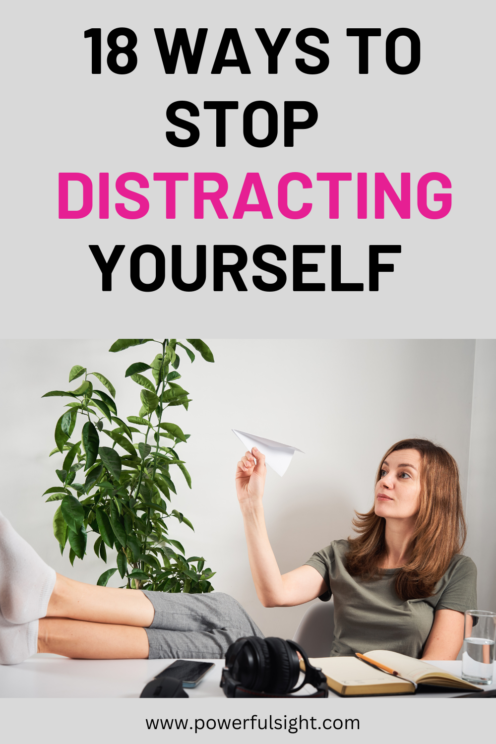Distractions are a constant companion, hindering productivity and focus. Whether it’s the allure of social media, the temptation of online shopping, or the constant barrage of notifications, distractions can derail your progress and leave you feeling overwhelmed. However, by implementing effective strategies, you can regain control and cultivate an environment conducive to concentration. Here is how to stop distracting yourself.
How to stop distracting yourself
1. Identify Your Distractions
The first step towards overcoming distractions is to identify their sources. Take a moment to reflect on the activities, devices, or environments that frequently divert your attention. Are you prone to checking your phone every few minutes? Do you find yourself mindlessly scrolling through social media feeds? Or perhaps the allure of online shopping proves too tempting? By pinpointing the culprits, you can develop targeted strategies to combat them effectively.
Related: How to focus on studying
2. Prioritize and Plan
Effective time management is a potent weapon against distractions. Begin by prioritizing your tasks and creating a structured plan for the day or week ahead. Allocate specific time blocks for focused work, breaks, and other activities. This structured approach will help you stay on track and minimize the temptation to succumb to distractions.
3. Eliminate Unnecessary Notifications
Notifications can be a significant source of distraction, constantly vying for your attention. Take control by disabling unnecessary notifications on your devices, including email, social media, and messaging apps. This simple step can significantly reduce the number of interruptions you experience throughout the day.
4. Create a Distraction-Free Zone
Designate a specific area or room as your distraction-free zone. This space should be free from potential distractions, such as televisions, devices, or clutter. By creating a dedicated environment for focused work, you’ll be better able to immerse yourself in the task at hand without external disruptions.
5. Use Website Blockers
If you find yourself frequently succumbing to the temptation of visiting certain websites or apps, consider using website blockers or productivity tools. These applications allow you to temporarily block access to distracting sites or set time limits for their usage, helping you stay on track and avoid unnecessary diversions.
6. Practice Mindfulness
Mindfulness techniques, such as meditation or deep breathing exercises, can help you cultivate a heightened sense of awareness and focus. By training your mind to be present in the moment, you’ll be better equipped to recognize and resist distractions when they arise.
7. Implement the Pomodoro Technique
The Pomodoro Technique is a time management method that involves working in focused intervals, typically 25 minutes, followed by short breaks. This approach helps you maintain concentration by breaking your work into manageable chunks, reducing the likelihood of succumbing to distractions.
8. Batch Similar Tasks
Multitasking is often touted as a productivity booster, but in reality, it can lead to decreased focus and increased distractions. Instead, consider batching similar tasks together. This approach allows you to fully immerse yourself in a specific type of activity, minimizing the need to constantly switch contexts and reducing the potential for distractions.
9. Establish Accountability
Accountability can be a powerful motivator in overcoming distractions. Consider enlisting the support of a friend, colleague, or accountability partner who shares similar goals. By regularly checking in with each other and holding each other accountable, you’ll be more likely to stay on track and resist the temptation of distractions.
Related: Minimalist habits to transform your life
10. Schedule Breaks and Rewards
While it’s important to cultivate focus and avoid distractions, it’s equally crucial to incorporate breaks and rewards into your routine. Prolonged periods of intense concentration can lead to burnout and decreased productivity. Schedule regular breaks to recharge and engage in activities that bring you joy or relaxation. Additionally, reward yourself for achieving milestones or completing challenging tasks to maintain motivation and a positive mindset.

11. Declutter Your Workspace
A cluttered workspace can be a breeding ground for distractions. Take the time to declutter and organize your physical environment. Remove unnecessary items, file away papers, and create a clean and organized space conducive to focused work. A decluttered workspace can help minimize visual distractions and promote a sense of calm and clarity.
12. Leverage Technology Wisely
While technology can be a source of distraction, it can also be a powerful tool for enhancing focus and productivity. Explore apps, software, or browser extensions designed to block distracting websites, track your time, or promote focused work sessions. Leverage these tools judiciously to create an environment that supports your goals and minimizes potential distractions.
13. Prioritize Self-Care
Neglecting self-care can lead to burnout, decreased motivation, and increased susceptibility to distractions. Make a conscious effort to prioritize activities that nourish your physical, mental, and emotional well-being. This could include exercising regularly, getting sufficient sleep, practicing mindfulness, or engaging in hobbies you enjoy. By taking care of yourself, you’ll be better equipped to tackle challenges and resist distractions.
14. Seek Accountability and Support
While personal accountability is crucial, seeking support from others can also be a powerful tool in overcoming distractions. Consider joining an online community or forming a local group with individuals who share similar goals and challenges. This support system can provide motivation, accountability, and a sense of camaraderie as you navigate the journey toward focused productivity.
15. Embrace Flexibility
While structure and routine are essential for overcoming distractions, it’s also important to embrace flexibility. Recognize that life is unpredictable, and unexpected challenges or circumstances may arise. Be prepared to adapt your strategies and adjust your approach as needed, without becoming discouraged or abandoning your goals altogether.
16. Cultivate a Positive Mindset
Your mindset plays a crucial role in overcoming distractions. Cultivate a positive and growth-oriented mindset by reframing challenges as opportunities for learning and development. Celebrate small wins and acknowledge your progress, no matter how incremental. A positive mindset can fuel your motivation and resilience, helping you overcome setbacks and stay committed to your goals.
17. Experiment and Refine
Overcoming distractions is a journey of self-discovery, and what works for one person may not work for another. Embrace the spirit of experimentation and be willing to try different strategies and techniques. Continuously refine your approach based on what resonates with you and what yields positive results. Remember, progress is rarely linear, and setbacks are opportunities for growth and adaptation.
18. Celebrate Progress and Milestones
Overcoming distractions is a challenging endeavor, and it’s essential to celebrate your progress and milestones along the way. Acknowledge the small victories, such as successfully completing a focused work session or resisting the temptation of a distraction. Celebrating your achievements, no matter how small, can boost your motivation and reinforce the positive habits you’ve developed.
Conclusion
Remember, overcoming distractions is a journey, not a destination. Embrace the process, celebrate your progress, and remain committed to cultivating an environment conducive to focused productivity.
Save the pin for later

- How to Find a Good Divorce Lawyer for Consultation - 14/06/2025
- 10 Best Personal Development Courses Online - 16/05/2025
- 157 Charming Vintage Baby Names (With Meanings) - 12/05/2025